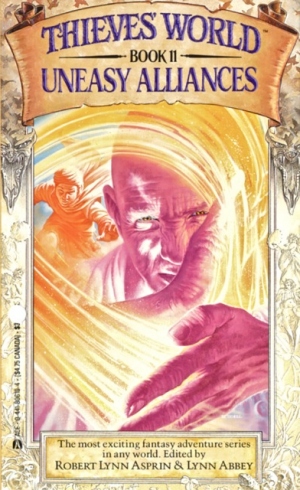Birthday Reviews: Jon DeCles’s “The Power of Kings”

Jon DeCles was born as Donald Studebaker on December 5, 1941.
In addition to writing, DeCles is also a Mark Twain interpreter, performing as Twain and giving lectures about the man’s life and career. He collaborated with Paul Edwin Zimmer on the novel Blood of the Colyn Muir. Studebaker married author Diana L. Paxson.
“The Power of Kings” was written for the eleventh Thieves’ World anthology, Uneasy Alliances, edited by Robert Lynn Asprin and Lynn Abbey and published in 1988. He would write a follow-up story for the next, and final, volume of the original series as well.
A troupe of actors led by Feltheryn has arrived in Sanctuary, where High Priest Molin Torchholder is building them a new theatre and has commissioned them to perform a play. Once a major actor in the capital of Ranke, Feltheryn and his crew are hoping to reestablish themselves in Sanctuary, unaware that Torchholder has specifically chosen a play that couldn’t help be political in nature and set to offend Prince Kadakithis and his lover, the Beysa. The story is clearly part of the woven tapestry of Thieves World and would not work well standing on its own.
The story deals with Feltheryn’s need to get the theatre in order, rehearse himself and his troupe, and keep tabs on his troupe, from his partner/lover Gisselrand, who is as focused as he is, to Rounsnouf, the comedian given a key dramatic role who is spending all his time at the infamous Vulgar Unicorn tavern. Into this schedule are thrown random groups of street toughs who want to avenge themselves on Feltheryn for not being able to rob him, as well as meetings, chance or otherwise, with various denizens of Sanctuary.
For someone who thrived in the capital, Feltheryn seems to have a poor sense for when he is being used a as pawn. Not only is Torchholder using him and the troupe for his own purposes, but many others who he or Rounsnouf come into contact with see the theatrical troupe as a means of advancing their own agenda. Even without the troupe being aware that anything is happening, they are moved in a political agenda which could (and should) be disastrous until Feltheryn’s quick thinking allows him to cast the situation in a more positive light.